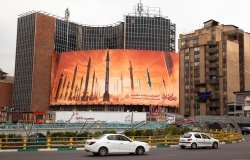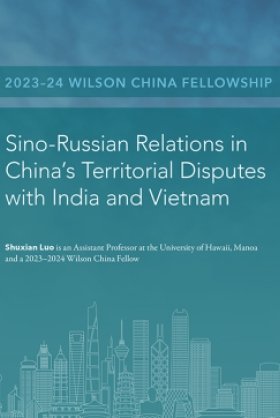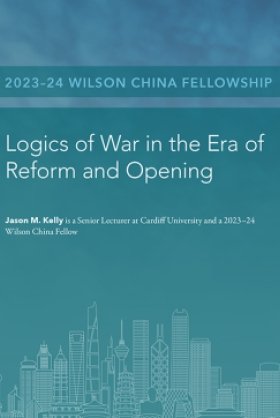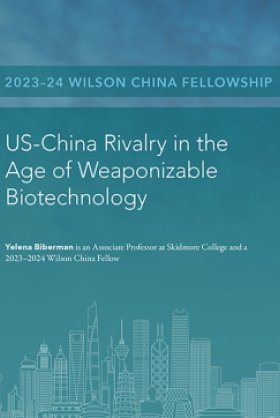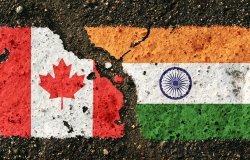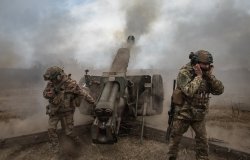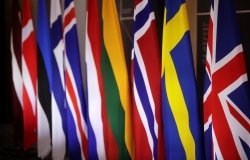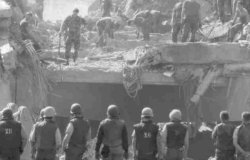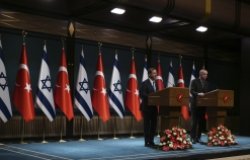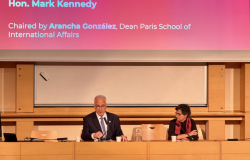332. Security and Insecurity in the EU Neighborhood and Beyond: In Search of Solutions
Lecture delivered by Valdas Adamkus, President of the Republic of Lithuania, at a Director's Forum held at the Woodrow Wilson Center on February 9, 2007.
The world as we know it today is rapidly changing. On the one hand, we witness a rise of new military and economic powers; we trace the nearly-invisible threats posed by the international terror networks and see new dividing lines between democracies and authoritarian regimes. On the other hand, two things remain the same: grave threats for global security and a necessity to think and act globally in response. Without our common actions, peace and stability will be in deficit around the world, divided by the haves and have-nots of the universal right to security and development.
This is a good point to start today's speech on transatlantic security policy issues in the EU's eastern neighborhood and beyond. The end of the Cold War brought the world a new wave of democracies in the East of Europe, but it did not bring a lasting peaceful solution. Security in the region—which neorealists like to call a geopolitical "buffer" between Europe and Russia and liberals prefer to call a strategic gateway and a meeting place between East and West—is not yet a finished business.
From the Gulf of Finland to the Black and Caspian Seas, a complex set of geopolitical and internal factors still constrain the development of civil society. The threats of terrorism, proliferation of weapons of mass destruction, infectious diseases, drug and human trafficking go hand in hand with the "classic" threats posed by "frozen conflicts" in such places as Transdnistria, Abkhazia or Nagorno-Karabakh. And this is despite the astounding success of NATO and EU enlargements.
What is obvious to me is that all of these regional security challenges cannot be successfully confronted by a single country, a single region or even a single powerhouse, such as the United States or the European Union. From the perspective of Lithuania—a country that builds its security around NATO and the EU—the most important thing is never to stop questioning and adjusting to new security challenges.
The essential question that I believe has been repeatedly posed in this hall is a very simple one: how can the transatlantic community work together to make the region and the world more secure? How can we strengthen our institutions to meet the known and new challenges, to lower the chances that we are caught off guard? What leadership qualities and new security partnerships will it require? The answers to these questions should be worked out as quickly as possible and they should be based on a transatlantic consensus. If we do not agree on a common vision and do not support it through joint action, I am afraid that we will become a part of someone else's vision. A vision that might resemble the nightmare scenarios we are reluctant even to think about.
Speaking about the lessons he had learned in the years he served as the General Secretary of the United Nations, Kofi Annan said that his first lesson was that the security of every one of us was linked to that of everyone else. This morning, I would like to focus on three interrelated security challenges that have strategic importance for the transatlantic community. First, what should we do together to modernize NATO and make it strong and relevant for future missions? How could we take advantage of the alliance as a beacon for democracy and peace? I believe it is a top priority to continue building on the legacy of NATO as the alliance of values and I will be happy to present Lithuania's view on this.
Second, how should we frame a new transatlantic dialogue in an era where previously peripheral issues suddenly occupy the center of our attention? How can we best match European and American means to strengthen the existing alliance and building new global security partnerships?
Third, what efforts should we take towards the creation of a transatlantic energy policy? What policy should we adopt towards Russia—a country that is absolutely critical in addressing our energy needs and a neighbor whose participation is vital for sustaining non-proliferation efforts, finding solutions for environmental problems and consolidating democracy in the Black Sea region.
Allow me take the NATO question first. It is the world's greatest democratic security alliance and we would certainly prefer to see it like this for many years to come. But NATO is once again at a crossroads, as it was eight years ago before embarking on its historical enlargement to Eastern Europe.
Today's challenges are not fundamentally different from those of the past, yet addressing them is essential for the future of the alliance. As conventional wisdom goes, NATO has to become global or go out of business. The alliance now has missions far beyond the borders of its member states and prepares for operations that require skills and engagements different from those it faced before. Yet, while building global partnerships, NATO at the same time has to remain strong about its initial goals, values and members' solidarity.
In this respect, the outcome in Afghanistan will matter greatly to the future of NATO. As Senator Richard Lugar rightly pointed out at the Riga Summit, "Afghanistan has become a test case for whether we can overcome the growing discrepancy between expanding missions and lagging capabilities." This is why it is so important that everyone accepts responsibility for its success. Lithuania plays its part in leading the Provincial Reconstruction Team in Ghowr Province, building trust and providing help to the local population. Despite having relatively small resources available, we have decided to send our special forces to Afghanistan's troubled South. We believe it is not only the size of the contingent but also solidarity between partners that matters.
In many ways, young democracies like Lithuania have a deep appreciation for what the alliance always stood for. NATO became one of the value-ridden cornerstones of Lithuania's foreign policy even before its membership. I think this explains why Lithuania and other newcomers to the alliance have eagerly responded to the US-led coalition of 48 willing nations to take part in the reconstruction of post-war Iraq. It is only on the basis of commitments to NATO that Lithuania will be able to strengthen its and its region's security.
While NATO cannot possibly be a solution for all security problems, it should remain the basis for transatlantic action around the world. I also think that the United States must encourage the European Union to play a bigger role in security matters. America needs the EU as a strong partner if the enlarged NATO is to remain successful. That is why we stand for a European Security and Defense Policy that would complement our commitments to NATO.
Now, there is also the issue of NATO's new enlargement or, as we know it, the "open door" policy. It reminds me of a joke that we used to tell while waiting for our membership invitation: "If you stand at an open door for too long, you can catch cold." Looking back at NATO's last enlargement, we have to remember how controversial it looked for many in academia and government alike. But today even Russia speaks of it as a success story. If all previous enlargements enhanced stability in Europe, why should this one be different? The prospect of membership alone encourages reforms, settles borders and extends liberal values. It also prevents the emergence of instability and provides the alliance members with enhanced capabilities beyond their borders. Therefore, enlargement should be a part of the alliance's modernization agenda.
I strongly support those aspirants that work hard to prepare for NATO membership responsibilities. As soon as they meet the criteria, Croatia, Macedonia and Albania should join the alliance to make an important contribution. There are also aspirants in the East and I wish to highlight the case of Georgia, which has become a role model for political reforms in the South Caucasus. There is also Ukraine, which continues to do its homework for membership. Though serious efforts should be made to inform the general public in Ukraine about what NATO stands for, I feel optimistic that eventually the day will come when Ukraine receives an invitation to join the club and will no doubt greatly contribute to the Euro-Atlantic security.
Some colleagues of mine say that Lithuania is one of the most pro-American countries in Europe. I take it as a compliment and as proof that our shared values lead us on the path of a common vision, grounded on strong transatlantic bonds. Being a new EU member state, we are also among the keenest, to put it bluntly, to keep the Americans in Europe. I believe that Europeans and Americans can complement each other in so many ways. We sometimes forget how important we are to each other. We keep spending our time looking back at the things that divided us, and soul-searching instead of looking forward and working for our mutual benefit.
Today, the EU can be proud of being a major soft power in the world. It is by far the world's biggest humanitarian aid donor. With new members joining, its influence will be even greater. In the past, we Europeans were often too slow in responding to the threats posed to world peace. From Kosovo and Bosnia to Darfur, Europe's actions were efficient when the transatlantic link was activated. Therefore, the United States and Europe should together define challenges and solutions before each declares its own way. It is not a question of following one another, but about true partnership and common values. Whether it is Iran's ambitions to build nuclear weapons, the peace process in the broader Middle East or the consolidation of democracy in the Black Sea region, our agenda should be based on consensus and marked by swift and timely action.
As Senator John McCain said last year in Brussels speaking about the partnership of the US and Europe: "We have to define their policies not just by what we stand against, but also by what we stand for." And we all stand for the future of the world's democracies.
This brings me to the last point of my speech: energy security and transatlantic energy policy. It is argued that energy is so important that it must be treated differently. "National champions," vertically integrated energy monopolies, state-owned companies—all dominate the energy markets around the globe. Unfortunately, this also means that the economics surrounding energy transactions are not always transparent and rational. Sometimes these transactions are governed by political preferences. It is no secret that energy cartels prefer "energy islands" instead of predictable energy-as-commodity markets. The shortage of major electricity and natural gas suppliers and the lack of energy grids in Europe reinforce asymmetrical relations between producers and consumers.
In the coming decades, energy security will, no doubt, become a major issue due to energy scarcity, its inefficient use, the lack of investments and political manipulation. I would go so far as to say that competition for energy will emerge as the basis for future conflicts as the new big players, such as China and India, enter the market which has no spare capacity. How do we respond to these developments in a comprehensive and common manner? Is there a prospect for transatlantic energy policy or should we tackle these problems each on our own?
My first point would be that the free market has to prevail against politics, and not the other way around. This will not come easily. Four-fifths of world's oil reserves are controlled by governments through state companies, often lacking investments and traditions of efficient management. We could make a similar case for the gas sector. The EU and the United States face hard work ahead to convince producer countries that it is in their best interest to open up, let investments in and operate under market conditions. First of all, this concerns Russia, which we ask to ratify the Energy Charter Treaty. Only then can we enjoy equal opportunities to invest and attract investments to Russia's energy sector, which is in dire need of major renovation.
Second, talking to third countries is not enough to make us less vulnerable to energy shocks. We have to craft common policies that will help us diversify supplies and reduce addiction to oil, as President Bush put it last year in his State of the Union address, and lower the demand for natural gas. For example, the US and Europe have to work together to build supply networks from the Caspian Sea region and bring countries such as Azerbaijan and Kazakhstan to the world and European markets. It is important to open up those resources not only from a geo-strategic point view, but also for the advancement of democracy in the region between the Black and Caspian Seas.
Enhancing energy partnerships today is a major element of the European Union Neighborhood Policy and a clear indication of its significance to overall European security and economy. By having more supply options, we will be able to have more freedom and competition. But it also works the other way round. By integrating the economies of energy producers and transit countries we will create new security and political partnerships that will spill over to other sectors of the economy and trade. This will eventually lead to political stability and economic consolidation in the Caspian and Black Sea region.
Lithuania works very hard to give energy security a greater prominence on the European strategic agenda. I have always stressed that first of all we need to speak in a single European voice on energy matters and upgrade the common EU energy policy. Without it, we will continue the awful tradition of waiting for New Year "surprises" when gas or oil supplies are cut off to EU customers due to the "Russian way" of negotiating the price of oil or gas with its neighbors.
Energy and its grids are vulnerable not only to government interference. Supply networks are potential targets for terrorists who can disrupt the economies of entire regions. Here, NATO has to come in and work with its global partners to review its internal commitments and determine how to respond to such crises. Crisis prevention and crisis management in this area have a lot of room for mutual action.
In this context, I would like to touch upon the topic of Russia, since it is of high relevance to our region. What policy should the transatlantic community adopt towards Russia—a country that is absolutely critical in addressing our energy needs? Russia likes to declare that it is a reliable partner—which we all would like it to be. Just as the US and Europe need each other, we need Russia to stand with us and help address global challenges.
Let's make no mistake—today's Russia differs profoundly from what it was ten years ago. Russia's growing middle class, stabilization and growth of economy are positive developments. But there is also an erosion of democratic freedoms, the centralization of power in the hands of the Kremlin, harassment of foreign investors, corruption and organized crime. This has let many in your country to believe, including the Independent Task Force of the Council on Foreign Relations, that Russia is heading in the wrong direction. I would say that today Russia faces a strategic choice: will it become a part of the system of democratic states of Europe or will it choose to remain outside, inventing a special kind of the so-called "sovereign democracy"?
On many important questions Russian policy looks unworkable and extremely selfish. Its national interests are often considered as prevailing over the legitimate interests of its Eastern European neighbors. On certain issues Russian policy looks openly confrontational, especially when it uses energy as a weapon to obtain economic and political gains that are counterproductive to rational cooperation and good neighborly relations. I am certain that the transatlantic community has to be absolutely honest and speak out that only a democratic Russia linked to Europe by geographic, cultural, strategic and economic ties will have a greater say in Euro-Atlantic affairs.
Relationships that are built upon a coincidence of interests have never been particularly stable. We should engage today's Russia and lay the foundation for working with the democratic Russia of tomorrow. There is much more that we can add to our cooperation beyond trade in energy resources. The peaceful resolution of "frozen conflicts" will be a litmus test for whether a major breakthrough in our relations is possible. It is in the interest of everyone, including Russia, that countries in the East of Europe forge closer trade, economic and security ties with the Euro-Atlantic community. The history of a double-track policy that embraced NATO and EU enlargements and good neighborly relations with Russia has already proved its success. We should continue on the same path when gradually integrating Ukraine, Georgia or Moldova into the Euro-Atlantic cooperation network.
There are almost no international security challenges that the European Union or the United States face separately from each other. This makes me believe that nations sharing values and common interests make natural partners. There is an important role for political leadership. There is a moral obligation for Europe and the United States to promote the enlargement of a democratic community. If we succeed, tyranny, poverty and intolerance will give way to prosperity, mutual understanding and shared responsibility for world affairs.
With global challenges come global responsibilities. In the course of history, Europe and the United States have learned that achieving our own security does not always make conflicts go away in the neighborhood. But we also have learned that some things never change, and I have in mind the transatlantic alliance of values, which we treasure. With this in mind, I am sure that the European Union and the United States will remain key drivers of this global and open community.
About the Author
Valdas Adamkus
Read More
Global Europe Program
The Global Europe Program is focused on Europe’s capabilities, and how it engages on critical global issues. We investigate European approaches to critical global issues. We examine Europe’s relations with Russia and Eurasia, China and the Indo-Pacific, the Middle East and Africa. Our initiatives include “Ukraine in Europe” – an examination of what it will take to make Ukraine’s European future a reality. But we also examine the role of NATO, the European Union and the OSCE, Europe’s energy security, transatlantic trade disputes, and challenges to democracy. The Global Europe Program’s staff, scholars-in-residence, and Global Fellows participate in seminars, policy study groups, and international conferences to provide analytical recommendations to policy makers and the media. Read more
